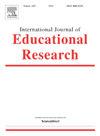中学生数学自我效能感来源量表的内部结构
IF 2.5
3区 教育学
Q1 EDUCATION & EDUCATIONAL RESEARCH
引用次数: 0
摘要
本研究旨在调整并收集智利中学生数学自我效能感来源量表的结构效度证据。该样本包括智利不同学校类型的1740名六年级到九年级的学生,克服了以前来自西班牙语国家的研究使用更有限样本的局限性。效度和信度分析显示四个因素与原量表一致。验证性因子分析,包括多组模型的性别显示强拟合指数。内部一致性分析为每个子量表产生适当的Cronbach's Alpha值。综上所述,数学自我效能感量表的来源具有稳健的效度和内部一致性指标,适用于研究、政策制定和学校数学教育。使用与文化相关和性别敏感的语言对量表进行调整,为了解智利中学生数学自我效能感的来源提供了有价值的见解,有助于更广泛地了解教育心理学,并为提高学生的数学信心和表现提供干预措施。本文章由计算机程序翻译,如有差异,请以英文原文为准。
Internal structure of a scale of sources of self-efficacy in mathematics among middle-school students
The present study aims to adapt and collect evidence of structural validity of a scale measuring the sources of mathematics self-efficacy among Chilean middle-school students. The sample comprised 1740 students from 6th to 9th grades across different school types in Chile, overcoming limitations of previous studies from Spanish-speaking countries that used more limited samples. Validity and reliability analyses revealed four factors consistent with the original scale. Confirmatory Factor Analyses, including multigroup models by gender demonstrated strong fit indices. Internal consistency analyses yielded appropriate Cronbach's Alpha values for each subscale. In conclusion, the sources of mathematics self-efficacy scale demonstrates robust validity and internal consistency indices, making it suitable for research, policy development, and mathematics education in schools. This adaptation of the scale, using culturally relevant and gender-sensitive language, provides valuable insights into the sources of mathematics self-efficacy among Chilean middle-school students, contributing to the broader understanding of educational psychology and informing interventions to enhance students' confidence and performance in mathematics.
求助全文
通过发布文献求助,成功后即可免费获取论文全文。
去求助
来源期刊

International Journal of Educational Research
EDUCATION & EDUCATIONAL RESEARCH-
CiteScore
6.20
自引率
3.10%
发文量
141
审稿时长
21 days
期刊介绍:
The International Journal of Educational Research publishes regular papers and special issues on specific topics of interest to international audiences of educational researchers. Examples of recent Special Issues published in the journal illustrate the breadth of topics that have be included in the journal: Students Perspectives on Learning Environments, Social, Motivational and Emotional Aspects of Learning Disabilities, Epistemological Beliefs and Domain, Analyzing Mathematics Classroom Cultures and Practices, and Music Education: A site for collaborative creativity.
 求助内容:
求助内容: 应助结果提醒方式:
应助结果提醒方式:


